Monthly Journal
July 2022
International Media Digest
The most relevant events of the area through international sources
AFTER MASS PROTESTS, HIGH REPRESENTATIVE IMPOSES PARTIAL ELECTORAL LAW REFORM
The High Representative in Bosnia and Herzegovina (OHR), Christian Schmidt, imposed a partial, primarily technical and transparency-oriented electoral reform just few months before the October general elections, despite significant tensions, particularly among Bosniaks parties. Schmidt implemented the amendments using the so-called “Bonn powers”. The powers enable the Office of the High Representative (OHR), which monitors the Dayton Peace Agreement’s implementation, to enact legislation.
For nearly two years, Bosnian political leaders have attempted to agree on changes to the electoral law and the Constitution of the Federation of Bosnia and Herzegovina, the larger of the two country’s entities, but all attempts have failed. The most recent attempt took place in January when political leaders once again refused possible changes.
Local Sarajevo media reported in July, citing unnamed diplomatic sources, that Schmidt planned to use his ‘Bonn Powers’ to impose broader measures to ensure a better functioning of Bosnia’s Federation (FBiH) by August 1. The draft decision listed changes to the law concerning the functioning of the houses of Parliament, the election of the leadership of the Federation entity, and the election of judges to the Federation entity’s Constitution. The proposal also included changes to the law concerning the operation of the Parliament, the election of the Federation entity’s leadership, the election of judges to the Federation entity’s Constitutional Court, and changes to ensure the integrity of the election process. Critics claimed that the possible changes in the electoral system could impact negatively the delicate political structure in BiH, a move particularly dangerous if undertaken just before the elections, and in that way deepen the already existing ethnic fractures.
The criticism came in the first place from Bosniak politicians in Sarajevo, who have called the leaked plans discriminatory, claiming they are only meant to benefit the HDZ, Bosnia and Herzegovina’s main Croat party. Mass protests, the largest in the country in recent years, were held in front of the OHR headquarters in Sarajevo and supported by most Bosniak political parties. Opponents of the changes argued that they would lead to further ethnic divisions in the country. On the contrary, the HDZ in Bosnia and Croatia openly supported Schmidt’s plans.
Following the protests and after meeting the politicians of the Federation, on July 27 Schmidt decided to impose only minor technical changes aimed at the transparency of the election process, and asked political leaders in the country to act fast to agree on a more comprehensive reform.
“I impose a package of transparency that guarantees a free and fair campaign,” Schmidt explained subsequently, adding that he also spoke “very clearly with the leaders of the main parties from the Federation. I await (now) the results. I expect them to do something for the country and the people of the country where they live. This is not a friendly suggestion; this is their obligation. If they fail to do that, I will take responsibility based on the Dayton Peace Agreement, given to me by those who signed it,” Schmidt underscored. He also said that he did not want to “give the impression that Bosnia and Herzegovina are being divided into different ethnic regions. No, for God’s sake, I am here precisely to prevent that and to maintain the so-called territorial integrity,” the High Representative stressed.
However, the overall situation in the country does not leave much room for optimism. Bosniak leaders welcomed Schmidt’s announcements and said they would now work on a more inclusive reform. On the contrary, the Croat National Assembly (HNS BiH), the umbrella organization of Croat ethnic parties in Bosnia and Herzegovina, stated that the High Representative in BiH succumbed to “unprecedented war-mongering pressure” from Bosniaks and missed an opportunity to impose electoral reforms, adding that one can only guess “the scale of the political crisis after the elections.”
SERBIA ACCUSES KOSOVO OF THREATENING WITH WAR WITH NEW RULES ON CAR PLATES
It seems that Serbia and Kosovo are heading towards a new dangerous crisis after the long-standing issue of car plates and personal documents, which caused severe troubles in the past, re-emerged this summer.
Kosovo and Serbia agreed in 2011 in Brussels to issue two types of licence plates, the RKS for the Republic of Kosovo and the KS plates, due to Serbia’s refusal to recognize Kosovo. However, in the north of Kosovo, with a majority Serbian population, cars with Serbian Ministry of Interior licence plates have continued to be used. Kosovo extended the validity of KS plates until 2021. The licence plate agreement expired in September 2021. Meanwhile, Belgrade and Pristina reached an interim agreement to cover state symbols with white stickers.
However, the problem resurfaced after the Kosovo government announced implementation of reciprocal measures for Serbian citizens entering Kosovo. Serbia does not recognize Kosovo personal ID documents and issues temporary ID cards to Kosovo Albanians upon entry. The Kosovo government, led by left-wing nationalist Prime Minister Albin Kurti, decided to undertake a reciprocal measure and announced that it would issue temporary ID cards to Serbian citizens entering Kosovo.
Furthermore, Kosovo has decided to oblige owners of vehicles with Serbian-issued license plates for cities and towns in Kosovo to replace their license plates with Kosovo (RKS) plates. Serbian license plates are easily identified because they begin with two letters denoting the city or town where the plates were issued. The government stated that the owners of vehicles with license plates ‘PR’ (Pristina), ‘KM’ (Kosovska Mitrovica), ‘PZ’ (Prizren), ‘GL’ (Gnjilane), ‘UR’ (Urosevac), ‘PE’ (Pec), ‘DA’ (Gjakovica), which Serbia issued from 1999 to 2022, would have to get RKS plates. According to the Kosovo government decision, Kosovo Serbs can re-register their vehicles beginning August 1 and ending September 31.
The Kosovo decision enraged the Serbian government and instilled fears in the Kosovo Serb population still living in the former Serbian province which declared itself independent from Belgrade in 2008. Serbian President Aleksandar Vucic condemned the Kosovo government’s latest decision regarding license plates for Serbs living in northern Kosovo, claiming that it aims to “expel Serbs, particularly from the north of Kosovo and Metohija.” He stated that Kosovo’s goal was to “create a new Storm,” referring to the 1995 Croatian army operation named “Oluja” (Storm), which forced the majority of Serbs to flee Croatia. However, “according to the agreements from the dialogue on freedom of movement from 2011 and 2016, Kosovo has the right to gradually abolish KM plates” issued by Serbia as only the license plates issued by Kosovo are (to be) used in Kosovo,” said an EU spokesperson.
The issue of documents and car plates might provoke unrest, particularly in the north of Kosovo and on the border passes between Serbia and Kosovo, particularly during summer when many emigrants go back home for holidays. It could also further strain the already tense relations between Belgrade and Pristina, with the EU-facilitated dialogue still stalled, despite some progress in the energy sector.
Further News and Views
Regional recap
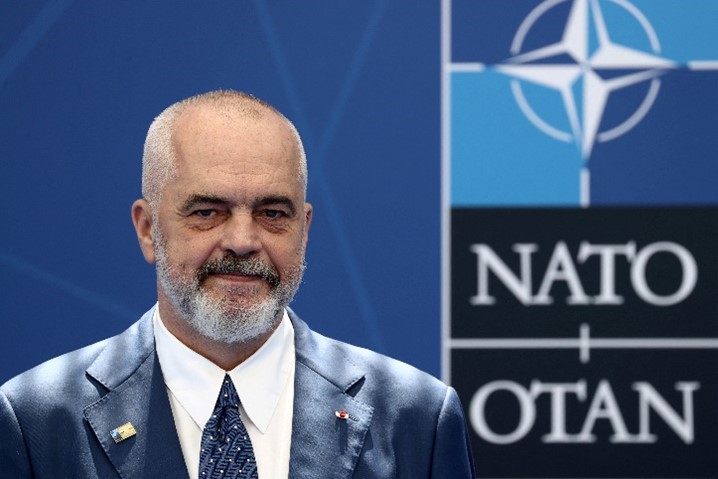
NATO’s first steps to build a naval base in Albania
Sources: Reuters, Euractiv, SeeNews, Argumentum
Prime Minister Edi Rama said that Albania is in talks with NATO about establishing a naval base at Porto Romano, a port built on the country’s Adriatic coast. Rama stated that Porto Romano, located near the coastal town of Durres and intended to be the country’s largest port, would consist of a commercial section and a military naval base. NATO and Albania would build and fund the military base, he said. Rama stated in May that his government would also offer NATO its Pasha Liman naval base, located 200 kilometres south of Tirana. NATO is already rebuilding the Kucova Air Base, located about 80 kilometres south of Tirana, to be used by the alliance. Albania was admitted to NATO in 2009.
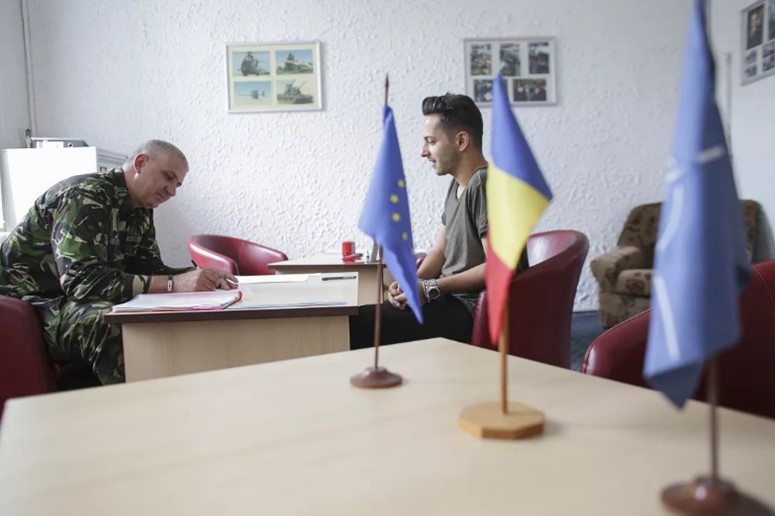
Romania drafts law for calling emigrants back in case of war
Sources: Kyiv Post, Romania Insider
As a clear sign of fears from Russia raising in Eastern Europe, Romanians living abroad will have 15 days to return to the country in case of a general mobilization or war, according to a new draft bill published by the Ministry of Defense. As reported by Stirileprotv.ro, the draft bill stipulates how Romanian citizens fit for military service are to fulfil their constitutional obligation to defend the country. In sum, when the state of emergency is declared, the Romanian ex-pats will have to return to their domicile in Romania at the date and time provided in the summons or as provided by law. The draft bill, as reported by Stirileprotv.ro, exempts citizens who have completed training in the army of another state.
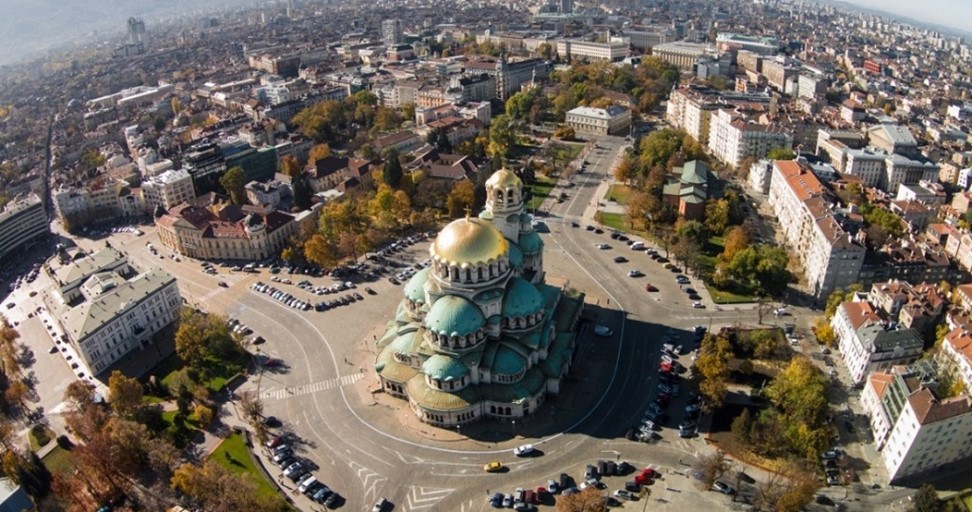
Bulgaria is heading towards new elections
Sources: The Associated Press, Euractiv, France Press
Bulgaria is set to hold snap elections again after the latest attempts to form a government failed at the end of July, deepening a political crisis that began with the collapse of a reformist coalition in June. The two largest parties, the liberal PP of outgoing Prime Minister Kiril Petkov and the conservative GERB of three-time former Prime Minister Boyko Borisov, failed to secure a governing majority in the 240-seat Parliament. President Rumen Radev then tasked the Socialists with creating a ruling coalition and avoiding a fourth general election since April 2021. However, Socialists could not persuade lawmakers to vote on a proposed six-month plan for a new coalition government.
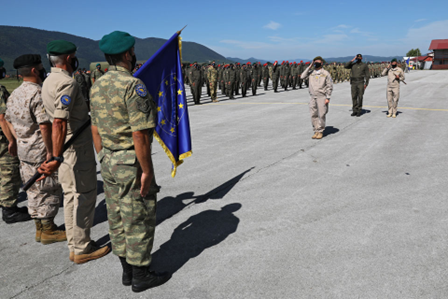
NATO concerned about destabilizing activities in Bosnia, Russian veto
Source: N1
NATO is working to find a solution to a possible Russian veto in the UN Security Council on the EUFOR Althea peacekeeping mission in Bosnia, NATO Military Committee Chair, Admiral Rob Bauer, told to the regional television channel N1. He added that NATO is working to strengthen BiH’s resilience and ensure that the BiH Armed Forces develop their capabilities and operational readiness. According to him, some “statements of the Russian Embassy in BiH” point to destabilizing activities, a reference to Moscow’s threats in case of Bosnia entry into the Alliance. NATO’s efforts are aimed at increasing BiH’s resilience and ensuring that the Armed Forces continue to develop their capabilities and operational readiness programme.”
Monthly Analysis
The deep dive: strategic trends
ALBANIA AND NORTH MACEDONIA FINALLY OPEN EU NEGOTIATIONS
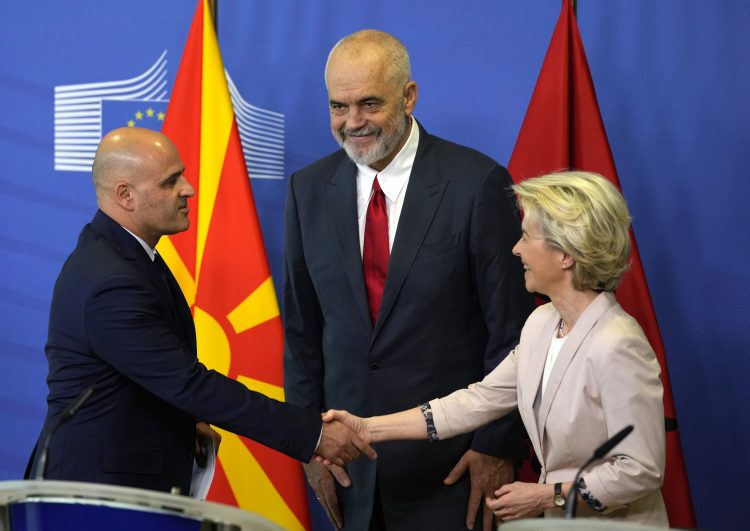
With a two-year delay, the European Union officially launched accession talks with North Macedonia and Albania in July. This was a long-awaited move in two countries that have pursued painful reforms to progress towards EU membership but faced significant obstacles, particularly from EU member Bulgaria.
Sofia decided to halt Skopje’s EU accession process, which was ‘coupled’ with Tirana’s, due to disagreements with neighbouring North Macedonia over the Bulgarian minority, history, and language. On a similar veto from Greece, North Macedonia already changed its name in the attempt to progress towards the EU membership. However, soon after Bulgaria opened a new by insisting that the Northern Macedonian identity and language are of Bulgarian origin and that Bulgarians are there oppressed, hence demanding that their protection be included in the in North Macedonian Constitution.
Only after Skopje’s Parliament voted in favor of reaching a compromise on the long-standing dispute with neighbouring Bulgaria — based on the so-called ‘Macron proposal’ — did North Macedonia and Albania receive the bloc’s green light to begin accession talks formally. As per the accord, North Macedonia would commit to changing its Constitution to recognize a Bulgarian minority, protect minority rights, and ban hate speech, as Bulgaria, an EU member since 2007, has demanded. Macron emphasized that the proposal does not call into question the existence of a Macedonian language. Still, he added that, like all deals, it “rests on compromises and a balance.”
Several experts on the Balkans criticized Macron’s proposal. The political analyst Florian Bieber said on Twitter that the proposal is “a disaster for enlargement,” as “it achieves little and holds great dangers”. The proposal “incorporates the bilateral dispute into the EU negotiating process, giving legitimacy and encouragement to future EU members blocking accession countries,” Bieber underscored. He further noted that “it essentially accepts the nationalist logic” behind the Bulgarian government claims “that there is an issue of discrimination against Bulgarians in North Macedonia.”
The French proposal sparked also massive street protests in Skopje and other North Macedonian cities, led by nationalists and left-wing and pro-Russian groups, with authorities in Skopje warning that Moscow could be behind the protests. Thousands of people demonstrated for days, even clashing with police and throwing plastic bottles, water balloons, stones, and eggs at government buildings in the capital. Demonstrators claimed the proposal “Bulgarianizes” the country and failed to recognize the Macedonian language and history. The main opposition party in North Macedonia, VMRO-DPMNE, and other right-wing and left-wing opponents demanded that the government rejects the plan, claiming it conceded too much to Bulgaria in the long-running dispute over history, language, identity, and culture.
While Macedonian Prime Minister Dimitar Kovacevski said the French proposal was a “solid base for building a responsible and statesmanlike stance on the possibility that opens up to our country,” opposition parties left Parliament in protest. Eventually, they abstained from voting on the proposal, which received support from 68 MPs in the 120-member Chamber.
After the green light of the North Macedonian Parliament, the EU welcomed the “historic” vote that “has opened a door and an intergovernmental conference will launch the process of negotiations, a long-awaited process,” the EU High Representative for Foreign Affairs Josep Borrell said. “Congratulations to North Macedonia on the vote that now paves the way for opening the accession negotiations rapidly,” EU Commission president Ursula Von der Leyen also said. “At this critical moment in European history, marked by the unjustifiable aggression carried out by Russia against Ukraine, advancing Albania and North Macedonia’s EU path is key to strengthening the cohesion and resilience of the entire European continent,” the US Department of State underscored.
Soon after, the EU began formal negotiations with both countries. The EU has “just agreed to open accession talks with Albania and North Macedonia,” Czech Prime Minister Petr Fiala, whose country currently holds the rotating presidency of the European Union, wrote on Twitter. “We have taken another important step towards bringing the Western Balkans closer to the EU,” Fiala said.
The Commission will now begin its screening process with representatives from Albania and North Macedonia in what is expected to be a lengthy and complicated process that will last years, as demonstrated by the examples of Montenegro and Serbia, which have been negotiating with the EU for nearly a decade. Even though several EU member states, including Slovenia, advocated for Bosnia and Herzegovina to be granted candidate status, EU leaders did not take the step at their most recent meeting in the summer, a move that could lead to more instability in the region.
The Insight Angle
A regional political interview

SERGIU MISCOIU
Political analyst
and Professor of Political Science at Babeş-Bolyai University
Cluj-Napoca (Romania)
The Bulgarian veto was finally overcome in July, allowing North Macedonia and Albania to start EU accession negotiations after years of delay. How important is this step for the stability of the Balkans? And how damaging was it to keep Skopje and Tirana in the corner for so long?
This decision occurred at a crucial geopolitical moment, along with other decisions motivated by the current major war at the EU’s Eastern border. Like in the case of the decision to invite the Republic of Moldova and Ukraine to acquire the status of candidate countries (which is a mandatory step but not a guarantee before the opening of the accession negotiations), the critical arguments were no longer related to the EU’s capacity of absorption and integration of new members, but rather to the urgent need to secure the two countries as pro-Western liberal democracies. So, even if there is no ‘fast track’ to EU full membership and the negotiations will be conducted field by field and file by file, as they should be, the very decision of initiating them testifies to the high degree of concern of the EU leaders concerning the possible ‘illiberal twist’ of some countries if they are kept too long in the corner and accumulate in this way frustration and resentment. The lesson taught by the long and inconsistent process of pre-negotiations with Turkey, which turned from a semi-consolidate democracy into a semi-authoritative regime, is particularly revealing and worked as a significant warning for the EU leaders.
The conflict in Ukraine is still raging, and it’s having a profound impact in Southeast Europe as well, in particular on the front of energy. Romania is working, together with the US, on the first small nuclear reactor in Europe and to exploit more gas from the Black Sea, for instance. Moscow, meanwhile, cut the gas deliveries to Bulgaria in June. Are you concerned the same measures could be taken against other countries? If yes, how to react?
Romania is, to some extent, in a better position than its neighbours, as only about 10% of the total domestic gas consumption comes from Russia. On the other hand, as far as oil is concerned, about 30% of the imports are from Russia, while 7% of the total electric energy is imported from abroad, including Russia, but to a small extent. This last figure seems low, but it grew fast (at a rate of about 0.5% per year). That’s why it is vital to massively and rapidly invest in nuclear energy, based on the latest and safest technologies, as it is the only feasible way to secure energy autonomy in a long-term. I am neither optimistic nor too pessimistic about the prospects of the adaptation process, but, given the historical sluggishness of the institutional systems of the countries in our region, the premises are not necessarily brilliant. The leaders of these countries along with their citizens need to understand that energy dependence is a huge liability and could jeopardize the entire democratic and development acquis of the last 30 years.
Several countries in the region, in particular Albania, but also Bosnia and North Macedonia, witnessed mass protests due to the increase of fuel and food prices. Are you concerned the winter might bring mass unrests and possible destabilization of a region where life standards and salaries are still below the EU average?
Numerous trustful forecasts predict that the next winter will be particularly difficult for the low-income strata of the population, which are numerically important in this region’s countries. Prompted by different stakeholders who could profit from such turn of the events, the people could protest against their leaders and claim for more social justice, which the very neoliberal systems of those countries provide only to a minimum extent. There is a real danger of potential destabilization of some already precarious states under the rather more than less legitimate pressures of the ‘street’. In Bosnia and Herzegovina and, to a lesser extent, in North Macedonia, the ethno-cultural divides could play an important role in pushing the protesters to accuse the government of backing the other groups. All-in-all, in the absence of pro-active measures of social protection supported by the EU, the next winter could easily lead to a particularly tensed context in the Balkans and especially in these three (still) non-EU countries.
NATO recently reiterated the importance of the Balkans for the stability of Europe as a whole and its engagement in the region. How significant is now the NATO presence for the security of the region, but also of Romania and Bulgaria? And how serious are the threats of Russia in the Black Sea region and in the Balkans?
NATO is certainly a strong dissuasive force in the region and elsewhere in the world, but what matters the most is not the number of contingents that are present in Balkans but rather the very belonging of these countries to NATO. Putin knows that trying to attack one of the NATO members would immediately lead to a strong direct response of the entire alliance and Russia will be in the impossibility to match with such an immense force. Of course, the permanent training and common exercises of the NATO units in the region assure the interoperability of the member states’ armies and inhibit Russia also by showing the concreteness of the alliance’s existence. As we speak, there are 4.500 American, French, Belgian and Polish NATO troops stationed in Romania, who can count on its 75.000 men own army, while in Bulgaria there are 1.650 American and Albanian NATO troops and 27.400 Bulgarian soldiers. There is also a sophisticated NATO air defence system deployed in Romania. All-in-all, in Europe, there are 40.000 troops under the direct NATO command, 140 aircrafts, 120 ships and more than 100.000 US soldiers deployed on the continent. I believe that these figures speak by themselves.

Stefano Giantin
Journalist based in the Balkans since 2005, he covers Central- and Eastern Europe for a wide range of media outlets, including the Italian national news agency ANSA, and the dailies La Stampa and Il Piccolo.

